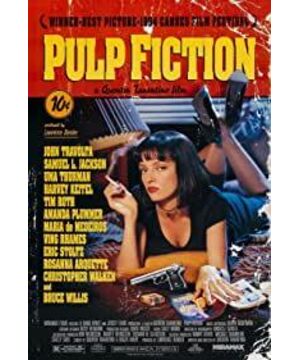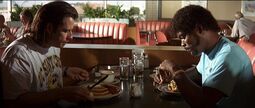Order means that there is some kind of procedural coherence, continuity and certainty in both natural and social processes. - Edgar Bodenheimer
beginning
Weinstein was probably going to jail, and Quentin wasn't implicated in the slightest. We've seen this name in the opening credits of Pulp Fiction, in a very retro font with an almost kitsch yellow, just like the rest of the opening text. This leaves us without a doubt: this is a Quentin movie. The misconception that Quentin is a certain kind of moviegoer has been around for a long time. As a former video store employee and a heavy movie fan, Quentin's love for movies is more inclusive and pure, including Hollywood B-level movies, Hong Kong martial arts movies, Japanese sword and halberd movies and so on. In 1994, Pulp Fiction won the Palme d'Or at the Cannes Film Festival. That year, Kieslowski's "Red" and "Pulp Fiction" usually competed and seemed to tell us the end of that film that belonged to the age of classicism. That year, another film that also used a circular narrative, "Heavy Rain", won the Golden Lion Award at the Venice Film Festival. It was a year of innovation in cinema, and Quentin had completed his foray into mainstream cinema. Cinephiles and tickets alone can't do all of this, and Quentin is very planned in his innovations in mainstream film aesthetics and narrative strategies. So, when he declares that he will only make ten films, we can find him more serious and explicit than directors such as Luc Besson and others who have made similar commitments.
eat and pull
Eating is a constructive force for the body. Cheeseburgers, vanilla shakes and bacon are delicious and provide essential nutrients for your body. "Pull" seems to be the opposite, associated with certain wastes and scum. We can't absorb everything under "eat". "Pull" is a temporary disorder. We see this important image three times in the film. Something big happened and someone happened to be in the toilet. They may have just avoided the disaster, or even have a certain advantage, or they may have lost the first opportunity and died directly on the toilet. The space corresponding to "pull" is the toilet. Quentin teases Vincent - a killer - and leaves him in the toilet pondering what to do next. Make big plans in a space that symbolizes disorder. The result was that the eldest's wife was already on the ground in shock due to overdose. So, "pull" is out of order. However, people will always come out of the toilet. Temporary disorder is also a construction, an indispensable part of order. In this way, disorder can also be an opportunity.
Song of Opportunity
Note: A Song of Opportunity is the title of a film by Kieslowski. In 1994, his "Red" lost to "Pulp Fiction." This great failure is hereby commemorated. The serendipity in the narrative is one of the things that make this film modern. And such contingency is often disabled in traditional narratives because it doesn't fit with the age-old tradition of "telling the story round." Accidental is seen as the playwright's show of timidity and the disorder of the entire narrative system. In this film, Quentin deliberately added a lot of accidental events, and before and after the events reflected the new situation of the characters themselves and the relationship between the characters. This can be seen as a reflection of the sense of contingency and absurdity in modern life. It also points to the constructive power of disorder as opportunity. Jules decided to wash his hands after the miracle of the gun, and the director then affirmed his choice with Vincent's death. Boxer Butch and eldest Wallace meet on the street and are imprisoned by a sexual pervert. The two finally turn their enemies into "cool". The couple who robbed the restaurant also seemed to get a better ending because of Jules' unexpected disorder. But paradoxically, disorder itself is not under human control, as the word already suggests. After all, you can never guarantee that you won't be beaten to death on the toilet. Mia's shock, the misfire in the car, and the humiliation of the boss by a sexual pervert, these disorders are catastrophe, and they are unexpected disasters. People have to run for it just to get back on track with their normal life. These disorders are so accidental and at the same time so fatal. When Vincent told Jules that he was going to be with Mia, we knew things were not going to go well. In the same way, the more we are told of the importance of the gold watch, the more convinced we are that it will always be lost, and the result may or may not be recovered. So, how uncontrollable the disorder is, the stronger the human desire to control it.
1, 2, 3
We've heard, "1, 2, 3". We heard it three times in the movie. As the protagonists try to hold on to things, everything is on the edge, on the edge of a razor, hanging in the balance. Will Mia wake up? The four were confronting each other with guns. "1, 2, 3". We want to get back the lost order. We hear Jules read the Bible aloud, twice. We heard Wallace speak harshly. We saw a lot of people in suits. The protagonists of the film take a stand, declare order, and try to maintain it. "1, 2, 3". The couple seemed to have made a sound judgment in the restaurant: No one would be called a hero in the restaurant. There will be no chance of getting in the way of their robbery. Jules read the Bible as if to express his principles. And Vincent repeatedly reminded himself not to cross the line.
About clips
At first glance, Pulp Fiction's cuts don't seem as brilliant as other aspects of the film. The structure of the chapters is also more about narrative strategy. In this film, the editor is often responsible for telling the story clearly and completing the secondary work of the narrative. However, it does exhibit a style that fits the 'disorder/order' theme almost perfectly.
Shifting and Hybrid
When we split the "injection" scene, we got 3 sequences of 6-7 shots, and their durations were 17 seconds, 7 seconds and 20 seconds respectively. We are using the same method to split the "Butch escapes after the game" scene, 2 sets of 4 shots, the duration is 30s and 3s respectively. It seems that we have encountered a trick commonly referred to as "quick editing". And if this sudden acceleration is seen as a disorganized tendency, then the return is the restoration of order. Therefore, no matter at the story level or the theme level, such an editing strategy (here, more of a sub-shot strategy) is a perfect combination of form and content. We can see back-and-forth sequences in the movie (it's Hollywood grammar), long-shot sequences (a kind of European grammar), and quick push-pulls and abrupt close-ups (B-movie style). They are often interspersed to enrich the visual narrative of the film.
B-movies and fetishes
As a sub-genre of the Hollywood industry, B-movies are often seen as clumsy and deliberate, and have long been excluded from the Oscar-dominated American film mainstream. In this film, Quentin just uses a certain kind of deliberateness in these shots. It is extremely efficient in grabbing the audience's attention in the first place. Showing the start of the car only requires close-ups such as the key and the accelerator. Second, its deliberateness itself coincides with some of the recent tendencies of European art cinema towards the presence of directors. It's these shots that give Quentin his unique style and distinct authorship, and presumably one of the reasons he ended up being favored by Cannes. In addition, these shots are also consciously or unintentionally associated with a certain fetish culture. We are probably more unforgettable of the lens group that Vincent took medicine. The telephoto lens gave a huge close-up of the various medicine utensils, resulting in an almost confusing aesthetic experience. Including close-ups of gold watches, hamburgers, various locks, and the often mentioned Quentin's foot fetish tendencies. The most obvious of which is the Jackrabbit Slims restaurant, which is filled with symbols of nearly every pop culture: from Cadillacs to Marilyn Monroe, it's like a museum of a century of fetishes. And the paragraph of the two dancing together, as a famous image in film history, seems to be added to it. According to Freud, fetishes arise from castration anxiety, the crisis of the "as-male" order. The addition of B-movie-style lenses also projects a certain castration anxiety in mainstream narratives, which in turn translates into focus and fascination with objects in close-ups. In the same way, this is also the stress response of wanting to regain order in a crisis of disorder.
end
Quentin deliberately subverts tradition with disorder, and re-establishes order in the opportunity of disorder. Like Jules, miracles and human agency can be unified. The gold watch is the most representative of the traditional American order, which has been passed down from generation to generation from Butch's grandfathers. The Vietnam War, both in a general sense (war is the disorder of civilization) and in a specific sense (the Vietnam War is a kind of disorder in the capitalist logic represented by American values), is a threat to the gold watch. During the war, this gold watch was preserved in a very unique and heroic way, and it was successfully passed on to Butch. At this time, it is already a completely new generation, with new values and order, but the gold watch still plays a role in him, not only at the narrative level, but also at the value level. The gold watch is not an order, but the order itself. Another interesting point is the couple who robbed the restaurant. Their famous image apparently comes from the 1967 American film "Her and Heist." Back then, the film was as subversive as Pulp Fiction was for 1994. A large number of violent scenes, the characterization of traditional villains as heroes, the implication of impotence for psychoanalytic interpretation, etc. are all very advanced and subversive. The interaction between Quentin and the film history here is to let the couple be crushed by Jules' values, and finally settled as a group of backs leaning on each other and leaving. The two rebels are weakened here. This is subversion of subversion. The male and female bandit who entered cinema history as the most famous disordered force is now defeated by the new order.
And as far as we can see, there are many things that are also defeated. But it was Quentin who triumphed, and everything about the movie that followed him at last.
View more about Pulp Fiction reviews











